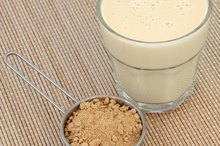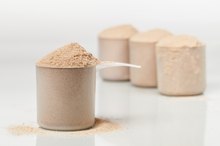Does a Protein Powder Have Carbohydrates?
People who consume protein powder usually want to supplement their diet with protein, not carbohydrates. Some types of protein powder, including soy and rice powders, contain naturally occurring carbohydrates. Some manufacturers add carbohydrates to protein powders to boost the calorie content or to make them taste more palatable. Read labels carefully to know what you are getting in the product you choose.
Indications
People use protein powder supplements to enhance muscle growth and promote immunity. Protein powders can also help add calories to your diet if you need to gain weight. For people looking to lose weight, a scoop of protein powder mixed into water or low-fat milk can be a healthy and satisfying snack. If you are a vegan, you may have trouble getting enough protein in your diet. Hemp, soy and rice protein powders can help boost your intake to reach the minimum 10 percent of daily calories from protein recommended by the Institute of Medicine.
Types
Casein Protein for Weight Loss
Learn More
Most health food stores are stocked with an array of protein powders. Whey protein, a derivative of milk, is easily digested and provides a complete amino acid profile, so it helps build muscle, especially after a workout. Whey also has immune-enhancing properties and contains a compound called glutathione that may have anti-cancer properties. Soy protein is one of the only complete vegetarian proteins, so it too can help with muscle growth and repair. Soy may also help reduce cholesterol and menopause symptoms. Casein protein is the other type of protein found in milk. It digests more slowly than whey and may help you feel full longer, thus assisting in weight loss. Hemp protein is a vegan protein high in omega-3 fatty acids and fiber. Rice and pea proteins are other vegetarian proteins and are easily digested. Hemp, rice and pea protein are not complete – meaning they lack one or more the essential amino acids the body needs. Eating a variety of foods daily, however, usually ensures you obtain enough amino acids for your body to form complete proteins.
Carbohydrate Content
A scoop of whey protein isolate contains 90 percent or more protein and only trace amounts of carbohydrates. Whey protein concentrate contains between 29 and 89 percent protein and typically 2 to 3 grams of carbohydrates per serving. Casein protein powder also contains about 3 grams of carbohydrates per serving. Soy protein powder provides some carbohydrates – 2 grams in 1 ounce of isolate and about 8 grams in 1 ounce of concentrate. One ounce of hemp protein contains about 14 grams of carbohydrates, and an ounce of rice protein has about 12 grams.
Considerations
Whey & Testosterone
Learn More
Commercial protein powders may contain sweeteners, flavorings and other ingredients that raise the carbohydrate content. If you want to avoid any added carbohydrates, look for 100 percent protein powder that is unflavored or has no-calorie sweeteners. Mixing protein powder into milk, juice or smoothies increases the carbohydrate content.
Related Articles
Writer Bio
Andrea Cespedes is a professionally trained chef who has focused studies in nutrition. With more than 20 years of experience in the fitness industry, she coaches cycling and running and teaches Pilates and yoga. She is an American Council on Exercise-certified personal trainer, RYT-200 and has degrees from Princeton and Columbia University.









